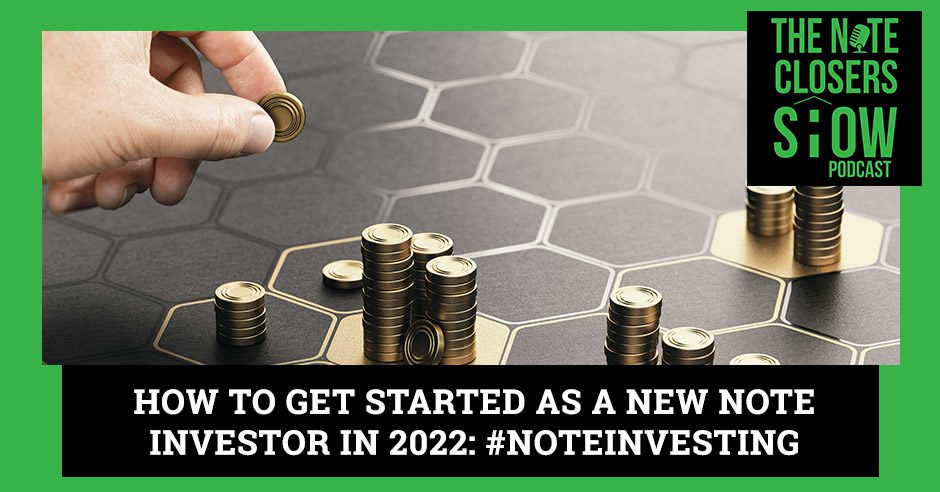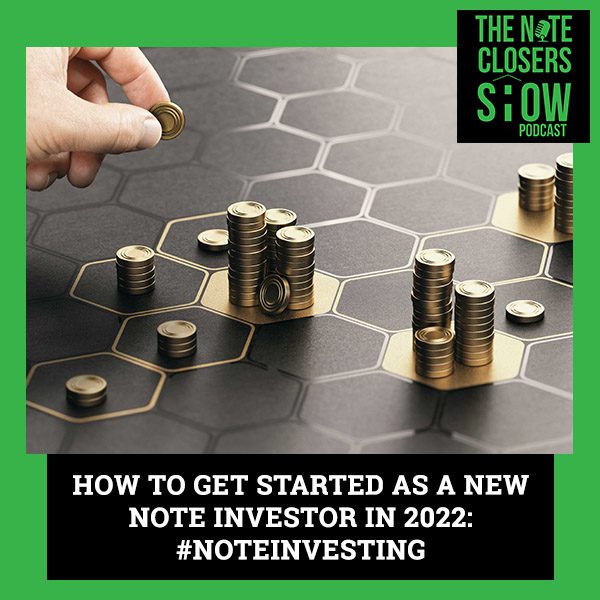
Are you looking to start investing in notes? In this episode, Scott Carson shares what he would focus on first if he had to start as a new note investor in 2022. He discusses the need to approach note investing with a fresh mind and realize it’s a different niche of real estate investing compared to being a landlord, fix and flipper, realtor, or mortgage broker. Finding and funding are the two most significant steps to your financial independence. Buckle down on the education side, learning as much as possible through workshops and classes because it is an essential path new note investors should take. Start your journey by learning from this conversation!
—
Watch the episode here
Listen to the podcast here
How To Get Started As A New Note Investor In 2022: #NoteInvesting
In this topic, I wanted to talk about starting over again. I get a lot of phone calls, emails, and messages from folks who are scared about everything that’s going on in the industry, like increased interest rates, inflation at all-time highs, cost of goods sold, gases through the roof, and people getting laid off from the mortgage industry left and right. Realtors are scared. There are 5 realtors for every 1 listing in a lot of cases out there. People are figuring out, “What do I need to do? On the fix and flip side, I’m not seeing REOs. What do I need to do to get into the note industry?”
That’s a beautiful thing because we see deals 6 to 12 months ahead of most folks, especially if you’re a fix and flipper, landlord, or REO investor. We’re seeing bigger discounts than most people are seeing. Here’s what I do. Now that we’re in the second half of 2022, the pied piper is finally getting paid. It has come to call to get paid from COVID, and them kicking the can down the road, the mortgage. Forbearance agreements are stopping things. We’re not going to see this wave of foreclosures happen all at once. You will see, as I like to say, a domino effect across the country.
What do I mean by that? Every state has a different foreclosure timeframe, the judicial states like Texas, Georgia, North Carolina, and Missouri. You’re going to see things happen faster there because you can foreclose faster. When you compare it to judicial states like South Carolina, Illinois, and Florida, which are about a year or thirteen months, that will be the second wave. It’s your faster judicial foreclosures. The final wave will come in New York or New Jersey if we ever get around to that in 24 to 36 months or later. You could throw in Puerto Rico if you’re looking for stuff in Puerto Rico there, too, because it’s about 27 to 30 months to foreclosure there.
You Got To Get Educated
If I was starting over brand new, these are the things that I would focus on. First and foremost, you got to get educated because if you’re coming out of the fix and flip mindset or landlord mindset, you are dangerous. You think you know everything there is in real estate. That is not the case. There’s no investing. It’s a whole different concept, evaluations, strategies, and end game in mind for the most part. It’s not to take real estate back. It’s primarily probably to get it reperforming and either A) Turn them into cashflow with performing notes, or B) You take the real estate back and either sell it off as REOs or, if you want to keep it to your portfolio, you can. Whatever you do after the foreclosure is up to you.
I will tell you this. The first thing I would do besides getting educated is to look at markets. By markets, I’m not talking about individual cities like Austin, Texas. I would be looking at states when I mean markets. Look at the states that have inventory and that have had a lot of distressed debt. If you’re in California, I’m sorry. You’re not going to see a lot of stuff that makes sense out on the West Coast, Arizona, Nevada, Washington, and the state of Oregon. You don’t see a lot of stuff there. If you’re reading from there, I love you guys on the West Coast, but you probably need to move your investment focus to Missouri or somewhere in the middle of the country for the most part, maybe the Big Ten Southeast Conference part of the United States, the Rust Belt.
We’ve had states like Alabama, Mississippi, and Louisiana that have been leading the foreclosure numbers since COVID started a few years ago. Look at states that have that stuff. You will always see distressed stuff in Ohio. You always see distressed stuff in Michigan, Indiana, and Illinois. Those are great areas, like Missouri, Kansas, Carolinas, and Florida. I’m starting to see uptick stuff things there too. There’s Maryland, some of Virginia, Georgia, and Texas. You’ll see some stuff, but stuff moves so quickly in Georgia. Unless you’ve got an inside track, you’re probably not going to see a lot of stuff in the state.
Here’s the thing. Identify 3 to 5 states, which is what I always tell people, and then learn what you need to learn about the states. Here’s what you need to learn besides educating about the note business. What are the foreclosure timeframes in those states? What are the foreclosure processes? What are the biggest cities? I would start with cities that are $100,000 or greater. The worst case is dropping down to $50,000 or greater. I’m buying a note now in a city, which is $25,000. It’s in Indiana, but I know that area. It’s near some other bigger cities, and I’m completely confident about that. Understand that you will see lists from all across the country.
There are some states that you want to avoid, for the most part, unless you live there and have some kernel of knowledge. One of those markets is Illinois, specifically Chicago Cook County. I like to call it Crook County. Illinois is not a bad state. It’s just that Cook County is difficult to foreclose in if you don’t live there. If you live there, by all means, you’ve got a lot of distressed deals there locally to deal with. It’s still going to be about a year to foreclose. If you’re an out-of-state investor, the judges and courts always seem to side with the local folks who live there. Whenever you see something Chicago Cook County, eliminate it from your list. The same thing goes for New Jersey. I eliminate those things.
Maybe get rid of Kentucky because they want a $500,000 bond if you’re an individual and $1 million bond if you’re a business. You don’t need that in other states. You need to get a licensed servicer first and foremost. Some states do require to have a bit more of a debt collector’s license. Illinois is one of the states where once you have a debt collector’s license, you’re going to pay your pound of flesh of $750 to the state and be good for two years. It’s not going to stop you from buying. It won’t stop you from foreclosing. In Georgia, the attorney general wants you to be a mortgage broker there. It doesn’t mean you have to have one to buy. It doesn’t mean you can’t get through foreclosure without having verified, but you don’t want to have that big brother potentially slapping you on the wrist. Look at some of the things.
Maryland’s got a debt collector’s license once they have final collections. They always wanted to go back to the short sale. In the last recession, they started making up names to collect fees. What I’m trying to get at here is you’re going to start seamlessly. One of the biggest things we have seen over the years and still to this day is when a big list comes in, people who don’t have their markets focused look at everything as an opportunity. At the right price, everything can be. You have to look at what you want for your portfolio. What states do you want to invest in? What states do you want to own real estate in? What states do you want to own notes in?
I wouldn’t be one of those individuals. I want non-traditional states or fast foreclosure states. You’re going to pay a premium for the faster foreclosure states. I want my backyard. If you live in a city like Austin, Texas, you’re not going to find a lot of stuff in your backyard. You’ve got to spread your interest out and take what the markets are giving you. Take the opportunities they’re given to you and focus on this. Here’s the thing too. If you’re using your own money, you can be as picky as you want to be. If you’re going to use other people’s money, you need to see deals that are going to be paying at least a 12% return to you if it’s a performing note or a non-performing note that is now performing like a reperforming.
You’ve Got To Get The Word Out
With a non-performing note that you’re going to end up foreclosing, you probably need to see somewhere around a 20% to 25% yield on that so that you can pay your money partners. The biggest mind block we see from folks that get into the note space is that they can’t get a hard money loan for a note. They can’t go and get a mortgage because they’re used to doing that, which traditionally is the fact that you have to start raising private capital. Here’s the thing, ladies and gentlemen. We say this time and time again. The media’s doing all the marketing and all the fear scarcity rules that they’re sharing out there, “Inflation and rates are up. Everything is more expensive.” Yes, everything is more expensive, but the thing that is not returning a lot is the capital.

New Note Investor: Everything is more expensive, but the things that are not returning a lot are the capital.
People that have money sitting in banks, savings, and checking accounts are making less than 1%. They’re all fearful because their 401(k)s are now 901(k)s. Their CD is a Certificate of Disappointment. They’re looking for opportunities. All that you have to do is start sharing the opportunities you’ve come across. You’ve got to share. You cannot be a secret agent. You can’t be James Bond and expect to succeed if you don’t want to share what you’re doing. You’ve got to tell folks what you do. You’ve got to get the word out. That’s more important than anything else. We see that the biggest contributing factor to success or failure is an individual’s willingness or lack of willingness to market.
You got to get the word out about what you’re doing. You’re going to share what you’re doing, share what you’re looking for, and share the deals you’re working on. You’re going to raise more capital and find more deals. If you’re not going to share, you’re not going to have deals come across. You’re going to be reliant on a few websites that I get picked over. You’re going to be reliant on what’s just in your bank account. That’s not a good way to be. You are not limited by what’s in your bank account to buy notes if it’s a good deal. You’ve got to be able to share it. You’ve got to embrace the 21st-century fact that you got to market.
I wouldn’t be marketing everywhere. I’d be marketing on LinkedIn, growing your database marketing. I’d be marketing with short deal videos, case studies, a deal that you’re working on, a day in the life of a note investor on YouTube, videos, whatever, LinkedIn, and Twitter. If you’re going to do it on Facebook, do it in your group or audience. I would not be sharing with other groups. There are a lot of real estate trolls out there and keyboard warriors that want to bash you when you post something or looking for something.
Facebook, as we all know, is a burning dumpster fire. Focus on LinkedIn. You got to spend time there. It’s pretty easy to connect with other note investors and real estate investors on LinkedIn. I would double down on one other asset class. I don’t mean by notes. Asset means investors. It’s jumping on the county records and starting pulling IRA investors who have bought a property and left money on their IRA. It’s pretty easy to search for those individuals by their self-directed IRA custodians like Quest, Equity Trust. I pulled 200 names just in one county with those three names. It’s over 200 contacts that we are going to market to for raising capital to use their money to buy our deals because everybody’s looking for deals.
Every IRA investor is an investor looking for deals. They pull the trigger. They are pretty knowledgeable, more than your average Joe on the street. They’re looking for a decent return. It doesn’t need to be 10% or 12%. It’s 6% to 8%. They’ve got money sitting on the sidelines for longer than twelve months. It’s pretty easy to sell into a deal that’s short term of 12 to 36 months. If I were starting over brand new, that’s it. No list. I would jump on LinkedIn and start looking for special asset managers. I would start searching out the servicing conventions, not industry conventions. What do I mean by that? Every year, there’s always a West Coast servicing and East Coast servicing conference that takes place.
The IMN.org or IMN Information Management Network has a lot of pretty great events you can go to. What they do is they share not the names of the people showing, like Scott Carson, but they would share titles and company names. If you pull that information and jump on LinkedIn with a VA or yourself, your virtual assistant can help you find pretty much most of those contacts without you having to jump on a plane and pay for a ticket. That’s what we do. I would jump on LinkedIn. I would go to these conferences and start pulling names and people off of that. I wouldn’t waste your time going to some of the smaller conferences. The investment summit’s second rendition was around many years and dropped off for a year or two and stepped back.
There are not a lot of people there. You’re not going to see a lot of distressed mortgage expos. You’re not going to see a lot of note expos besides the same people. You, as a note investor, don’t need to be talking to the same people over and over again. You got to get the word out to either find deals or find funding. The finding deal side is you reaching out to asset manager banks. That’s your posting on LinkedIn and going maybe some of the groups on LinkedIn that are distressed asset sales, secondary marketing professionals, or special asset manager groups. That’s your number one key. The capital raise, like I said, besides reaching out to IRA investors with a letter, postcard, or trying to find them on LinkedIn, is networking.

New Note Investor: You, as a note investor, don’t need to be talking to the same people over and over again. You got to get the word out to either find deals or find funding.
It’s not so much going to your local real estate investment club because that’s great, and everybody should be a part of the local real estate investment club, especially if you’re buying in a market. It’s one of the things we always say, “Find the local REI clubs or meetup groups that are in those markets for you, so you do have potential buyers of assets you take back or potential funders.” You’re probably going to have better luck by connecting with professionals who are understanding the value of the network. That means your entrepreneurial networking groups and your BNI networking groups like referrals because those are great at educating and looking for referrals. Go and attend to that. Maybe join one.
The beautiful thing about being a note investor is it’s a unique niche. You’re not a financial advisor. You’re not a fix and flipper. You’re an investor focused on one aspect. If it’s in a city that has a lot of stuff, great. If it doesn’t, you have opportunities to put people’s hard-earned money to work. It’s not like a financial advisor. You don’t want to act like that. You’re an investor looking for deals. That’s an opportunity for you because there are a lot of professionals out there that have money but don’t have the time to do it themselves. They would rather write you a check, get to know you, and invest. That’s a bit longer of an investment versus showing up for lunch or breakfast one day. You got to attend.
One of the things I did a few years ago was I went and attend most of the BNI networking groups. BNI stands for Business Network International. I got to know a lot of those professionals who are paying to be a part of the network. There are some other networking groups you can go to. There’s an apartment network group that might be one to go to because people are looking for deals. There’s usually a lot of capital sitting on the sidelines that they can’t get into a deal themselves. It might be a good spot for you to go to. Get out, start networking, and start going out to the things and maybe attending the chamber event.
There are a lot of entrepreneurs out there that are looking for help because they’ve got money, and they need somebody to help them with that. If you’re brand new, it’s okay. You may not have a big track record, but your vendors do. You’ve got a team already behind you the minute you decide that you’re going to be a note investor. That’s something unique that most folks can’t brag on. When you’re a note investor, you got a servicing company and real estate attorneys that are going to do the heaviest lifting for you. Hopefully, you’re taking note of this. Have somebody who you can reach out to when you have a question. If you ever need to schedule a call, TalkWithScottCarson.com to schedule a phone call.
Here’s one of the most important things. Don’t be scared. I know that’s easier said than done, but I would embrace this new time in your life as you dive into it as a great learning opportunity. The country is going through a bit of a reset. There’s more money and millionaires made in a time of turmoil than there is in a time of growth. There’s going to be a lot of distress debt. There can be a lot of mortgages hitting the market. If you know how to market and you can get further up that chain closer to the bank instead of waiting for a list to come to cycle down through a website or a onesie-twosies, you’re going to be a much better off basis now.

New Note Investor: The country is going through a bit of a reset. More money and millionaires are made in a time of turmoil than in a time of growth.
You Don’t Need A Million Dollars
I would be going to the county records as well with county clerks searching for assignment transfers from a few years ago, not the last six months. Look for an assignment mortgage that’s filed to the county to transfer ownership and look to see who sold the mortgage and who bought it. That’s the beautiful thing about an assignment. You’re going to have two parties, the company that sold it and the company that bought it. If you can pull LLC names of those that are around in the industry and stuff like that, you can often find who they bought from and find some amazing deals and direct sources. “Scott, I don’t have $1 million.” That’s great. You don’t need $1 million. You need some money for email marketing to send an email blast out and a little bit of some other tools.
I would highly recommend that you get LinkedIn. You can get the upgraded or do the free version. The point I’m making is to invest a little bit of money in tools that you’re going to use regularly. What I mean by that is a logo. You need to have a website. Don’t try to do it all yourself. I get it if you are strapped financially. You’ve been one of those that have faced the cutting axe of being laid off or fired. I get it. You got to start looking professionally. You got to start asking yourself, “Am I looking professional? Do I look like I have thrown it all together?” In this world, you got to have a website and logo. You need to create some business cards. You are still going to need that when you’re out networking with folks. Business cards are not dead.
There’s raising capital. You may have to spend a little bit of money on postcards or letters to send to 100 or 200 people. All you need is to develop 100 or 200 IRA leads and start marketing to them on a regular basis. Get Canva or Keap. YouTube is free. Get yourself a good webcam. Start listening to a podcast. Start connecting with people and going out. Don’t eat alone. If you need to go out to lunch, go to lunch and meet some folks. Go to breakfast and meet some stuff. You never know that these days, entrepreneurs are looking for opportunities, and you might want to be that opportunity for them. If not, somebody else will appear. That’s the thing.
As I said back in the very beginning of this episode, the thing that holds a lot of people back is them stepping out and being John Doe, John Smith, or Jane Smith note investor like, “I’ve been this. I’m scared. I’m an introvert.” I get it, but if you’re not happy with where you’re at, and you’re tired of being tired about your situation, you can either do something different and start planning seeds to yield, or you can keep doing the same old thing, and your situation’s not going to get any better. It’s going to get worse. If you just sit there, it’s going to get worse and worse. At some point, somebody’s going to make a decision for you where it might end up being that distressed bar. We don’t want that.
When you look at the amount of mortgage companies laying off and realtors out there that don’t have listings, and you look at a lot of the service industry where people have to tighten their belts up again, not because of COVID but because of inflation, that first time home buyer at $250,000 and below home, that’s what starts hitting the markets. That’s what starts getting distressed, those first-time home buyers, service industry, people that aren’t making a lot of money, making $20 an hour or less in a lot of cases across the country. That’s where you’re going to see a lot of the opportunity pop up for us as note investors buying that debt and then working to modify and getting them back on track and stuff.
You have to realize that if you aren’t a note investor and you’re brand new to it, you got to buckle down on the education side. Learn as much as you can. We have our workshops. We’ve got our classes. We are coaching. It is not an ad for that. It’s important if you’re going to dive in. If I were going to be an apartment investor, I would spend a lot of time learning about apartments. If I wanted to be a self-storage investor, I would learn as much as I could about self-storage. If I was going to be dealing with subject-to’s, which you’re going to see a lot of subject-to deals and opportunities, if you know how to market for those, I got to learn as much as I can about subject-to deals. It’s the same thing. Learn as much as you can about note investing.

New Note Investor: If you aren’t a note investor and are brand new to it, you have to buckle down on the education side and learn as much as possible.
The beautiful thing is we’ve got plenty of episodes, YouTube videos, and classes for you to learn from. The most important thing to do is to start to apply what you learn. Jump on LinkedIn, update your profile, start contacting asset managers, start contacting note investors, start looking at tapes, look at deals, and start to break down the due diligence. You can use some of the websites that are out there to look at deals and do due diligence, but they’re not going to be the best places to pick from.
I want to say competitor because he had to go back and get a job, but he sent out a news article or a white page on the six places to buy notes. 3 out of the 6 are no longer in business. I’m like, “That tells me you haven’t bought a note from them, even been buying notes for at least six months or, if not, a year.” Some of these have not had anything for over a year. Be careful about who you’re learning from.
One of the things you want to deal with is don’t be afraid to make mistakes. If you’re afraid of making mistakes, it will be hard for you. You’re going to make mistakes, but the real thing about the note business most of the time is as long as you’re coachable and ask for counsel, most of the professional investors out there will help guide you along the way and help you achieve a step on that path to your financial independence or whatever your long term goals are. It’s all about finding and funding. That’s the two biggest things. Those two finding and funding are united in the middle by marketing. Embrace the marketing.
If you’re new to marketing, you got to start investing in yourself because that marketing skills and tools are going to help you for a long time. As I know, most note investors and real estate investors never retire. We just get smarter and more focused. Usually, most real estate investors end up evolving into the note space to be the bank. I encourage you. Take action. Don’t be afraid to pick up the phone, ask questions, and get educated. We’ve always got our Note Weekend class, which is our one-day Saturday class. We have our quarterly class, our Note Buying For Dummies, that we host. You don’t have to attend it live. There are replays. Check that out at WeCloseNotes.com.
Ladies and gentlemen, there’s a lot of opportunity. I am excited for the second half of 2022 and into 2023. If you’re waiting around, do not wait around. Your boat will leave you. That horn is honking. That boat’s getting ready to leave port. You just got to jump on it and ride that wave. Focus on getting your first deal closed. Focus on getting your first private investor. Once you’ve done that, it’s a rinse-and-repeat model for the most part. Go out, take some action, everybody, and we look forward to seeing you at the top. Thank you for reading. Thank you for helping to make the show the number one note investing show out there. Thank you for helping make our YouTube channel the number one YouTube channel for note investors out there. I encourage you all to take action and kick ass. We’ll see at the top.
Important Links
Want to talk to Scott? Book a call with him HERE
Love the show? Subscribe, rate, review, and share!

